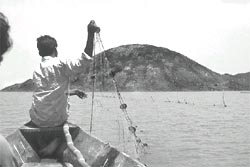Net bill, gross disaster
 it seems to be a never-ending battle. As the Aquaculture Authority Bill (aab) was placed in the Lok Sabha for the umpteenth time, fisherfolk from all over India took to the streets protesting against the Bill. In March 1997, the aab was first introduced in Parliament and passed within an hour in the Rajya Sabha. The Bill is yet to be voted by the lower house, though it has been listed for business in every sitting of the house.
it seems to be a never-ending battle. As the Aquaculture Authority Bill (aab) was placed in the Lok Sabha for the umpteenth time, fisherfolk from all over India took to the streets protesting against the Bill. In March 1997, the aab was first introduced in Parliament and passed within an hour in the Rajya Sabha. The Bill is yet to be voted by the lower house, though it has been listed for business in every sitting of the house.
The traditional fisherfolk living in the coastal areas of India oppose the aab vehemently. The Union government claims to have drafted the Bill in accordance with a Supreme Court's (sc) verdict in 1996 that banned commercial aquaculture firms (excluding traditional and improved traditional firms) in the coastal areas and ordered the government to establish a regulatory authority to monitor the implementation of its order and for further regulation of such firms. However, for the various representative bodies of traditional fisherfolk, the Bill seeks to bypass the sc judgement. "It is to legalise the existing aquaculture firms and to bypass the apex court's verdict that guaranteed the rights of traditional fisherfolk' rights over fishing,' says Thomas Kochery of the National Fishworkers' Forum (nff), a federation of different fisherfolk bodies from the coastal states which has spearheaded the movement against aab. According to nff estimates, more than 10 million traditional fisherfolk would be stripped of their sole means of livelihood besides their traditional rights over coastal areas, as guaranteed in the Coastal Regulations Zones notification of 1991.
As the protest rallies and lobbying with political leadership against the Bill seemed to go nowhere, the nnf, in a decisive move, sat on an indefinite hunger strike recently. The strike ended with an agreement between the Union agriculture minister, Nitish Kumar, and Union petroleum minister, Ram Naik, and Kocherry and Xavier Pinto of the nff. According to the agreement, the nff would submit proposals so that the apex court judgement is adhered to in the Bill. "It is a virtual submission by the government that the Bill is not in tune with the apex court's directives,' says a spokesperson of nff . But the agreement seems to have only deferred the voting and averted a crisis for the government since the government is yet to commit itself for inclusion of the nff proposals.
Controversy and protest have trailed this Bill since it was placed in the Rajya Sabha. "This is the most anti-people Bill ever presented in Parliament,' says R K Patil, general secretary of nnf who participated in the indefinite hunger strike in Mumbai. The origin of the aab can be traced to a sc judgment, which was delivered by Justice Kuldip Singh on December 11, 1996. While hearing a petition against violation of the Coastal Regulation Zones (crz) Notifications, 1991, the apex court ordered "all aquaculture industries/shrimp culture ponds operating/set-up in the coastal regulation zone, as defined under the crz Notification, shall be demolished and removed from the said area before March 31, 1997.' The court also mentioned about the environmental degradation caused by these shrimp farms. However, the court did not come down on traditional and improved traditional aquaculture.
The crz includes "coastal stretches of seas, bays, estuaries, creeks, rivers and backwaters which are influenced by tidal action up to 500 meters from the High Tide Line.' In addition, the court ruled that the industry had to compensate local farmers who had been displaced by the shrimp farms, and that the industry had to pay its workers compensation plus six years wages.
For India's multi-billion dollar shrimp aquaculture industry
